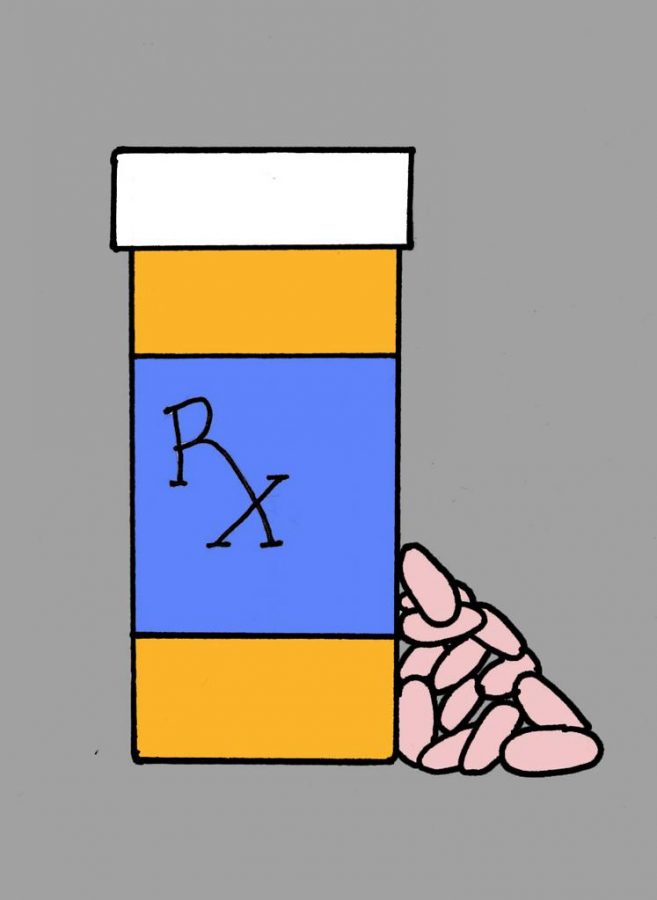Pitt pharmacy students reversed their traditional roles Thursday and collected drugs rather than distributing them.
Aiming to reduce drug misuse, members of Generation Rx — a student group within the American Pharmacists Association — collected unwanted and unused drugs from Pitt students, faculty and staff from 9 a.m. to 3 p.m in the University Pharmacy. Generation Rx partnered with the Drug Enforcement Administration, Student Affairs and Student Health Service to host the biannual Drug Take-Back Day.
The groups were promoting a “spring cleaning” of over-the-counter drugs and prescription medications, according to organizer Justin Saver. After the collection, the pharmacy students brought the discarded pills to the DEA so it could incinerate them.
“Everybody purchases meds, and this allows us to dispose of any leftovers in a safe and environmentally conscious way,” said Marian Vanek, Pitt’s director of Student Health Service, “No questions asked.”
Pitt’s event is part of National Prescription Drug Take-Back Day, which is April 30 this year, but the University moved the day up in order to accommodate finals. UPMC is hosting its own Drug Take-Back Day on Friday.
Although this is the fourth year Student Health Service has hosted a Drug Take-Back Day, and the third year Generation Rx has been involved, Pitt’s School of Pharmacy has been working throughout the year to protect against overdose.
In March, the pharmacy school established the Pennsylvania Heroin Overdose Prevention Technical Assistance Center to develop strategies for reducing overdose in Allegheny County and surrounding neighborhoods.
Pennsylvania is among the top 10 states with the highest opioid use and overdose rate, according to OverdoseFreePA, a Pitt pharmacy school website.
In Allegheny County, the number of fatal overdoses per year increased from 109 in 2000 to 393 in 2015.
There were 1,760 total overdose deaths in Allegheny County from 2008 to 2015, according to the Western Pennsylvania Regional Data Center — a coalition of Pitt’s Center for Urban and Social Research, the city of Pittsburgh and Allegheny County. Of the 226 deaths in 2015, 21 were victims between the ages of 18 and 25.
In this school year, The Pitt News has reported on two student overdoses. Guy Johnson, Pitt police community relations officer, said the Pitt police do not get many calls for overdoses.
Last year, Pitt police officers began carrying Naloxone, an antidote to opioids, as an emergency precaution, but have only used the antidote once. Nevertheless, Johnson said Pitt police take any drug or alcohol offense seriously.
“[Drugs and alcohol] all play a role in what may cause you to get into criminal aspect of things and may get in the way of what you come here for: a degree,” Johnson said.
Although Saver said the antidote is a good step, he is hoping to produce more efforts to reduce drug overdose on campus in the coming year.
“It’s a Band-Aid for a larger problem. That person is addicted,” Saver said. “We have to be able to catch it at the level of prescribing.”
According to a 2015 study by the Kaiser Family Foundation, pharmacies fill an average of 14.8 individual retail prescriptions each year for people ages 19 to 64 in Pennsylvania. The national yearly average is 12.6 prescriptions per person.
Saver said he is most worried about student use of amphetamine — a nervous system stimulant. Saver said he, and other students working at pharmacies on or near campus, see amphetamines “being distributed left and right.”
“It’s an issue that gets noticed around the country,” Saver said. “We used to just think of it as a problem for junkies, but for an average student, it’s becoming a problem.”
According to Saver, Generation Rx has collected 635 pounds of drugs in the past two years combined. This year, the group collected 235.7 pounds.
Saver said people bring medicines that they no longer need, caused unpleasant side effects or expired. In some cases, people want to get rid of medications from relatives that have passed away.
Saver said it is important to get rid of excess drugs to protect children in the house from getting them, discourage theft of such drugs, eliminate the potential for drug misuse and prevent contamination of wastewater and drinking water from the improper disposal of drugs.
Saver said he would like to introduce a program for first-year students during orientation — similar to AlcoholEdu — devoted to drug use.
Currently, the Counseling Center, within the Wellness Center offers counseling for students struggling with addiction, but Vanek said they are likely to refer a student to a rehabilitation center and help them through that process.
“I don’t think we have anywhere near the problem some schools have,” Vanek said. “But to say we don’t have any problem is unrealistic.”


